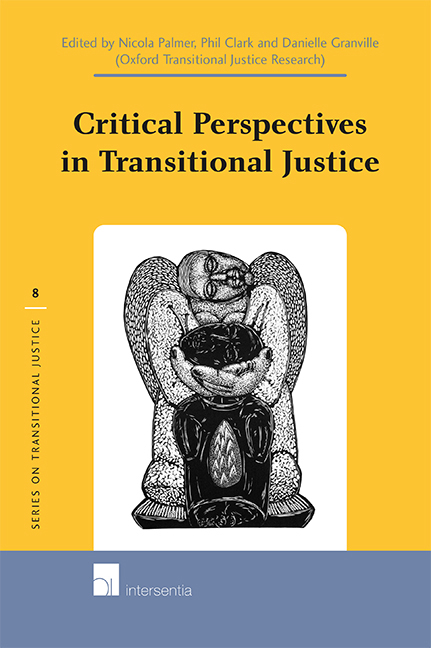Book contents
- Frontmatter
- Note
- Acknowledgements
- Contents
- Abbreviations
- Introduction
- Section 1 Critiquing Core Concepts in Transitional Justice
- Section 2 Accountability, Human Rights and the Rule of Law
- Section 3 Locality and Legitimacy
- Section 4 Memory, Ritual and Apology
- Section 5 Transitional Justice After Transition
- Contributors’ Biographies
- Series on Transitional Justice
7 - Accountability After Atrocity in Peru: The Trial of Former President Alberto Fujimori in Comparative Perspective
Published online by Cambridge University Press: 22 December 2020
- Frontmatter
- Note
- Acknowledgements
- Contents
- Abbreviations
- Introduction
- Section 1 Critiquing Core Concepts in Transitional Justice
- Section 2 Accountability, Human Rights and the Rule of Law
- Section 3 Locality and Legitimacy
- Section 4 Memory, Ritual and Apology
- Section 5 Transitional Justice After Transition
- Contributors’ Biographies
- Series on Transitional Justice
Summary
INTRODUCTION
Three days a week, for fourteen months between December 2007 and April 2009, former Peruvian president Alberto Fujimori sat before a panel of three Supreme Court judges tasked with determining his responsibility in a series of grave human rights violations committed during his ten-year administration (1990– 2000). This was particularly ironic given that during Fujimori's rule, the judiciary was stripped of its autonomy and became a tool in the regime's arsenal to sustain its rule, intimidate opponents, and organise a massive criminal network that experts believe was the most corrupt in Peruvian history.
Few Peruvians imagined such a trial was ever possible. Fujimori fled Peru in November 2000, amid explosive corruption scandals. Upon his arrival in Japan, the birthplace of his parents, he was provided protection by top political authorities and was quickly granted Japanese citizenship, effectively shielding him from the risk of extradition to Peru.
But events took a new turn in November 2005, when Fujimori left his safe haven in Japan for Chile. In what Naomi Roht-Arriaza has referred to as ‘the age of human rights,’ this was a critical miscalculation. Instead of launching a bid for the presidency in Peru's 2006 elections, as he and his advisers had planned, Fujimori found himself under arrest in Chile, and the Peruvian state quickly prepared an extradition request. After a long and complex process, the Chilean Supreme Court approved Fujimori's extradition in September 2007, and the former president was promptly returned to Peru. On 10 December 2007, his trial for human rights violations began.
The trial was long and drawn-out. More than 80 witnesses and experts were called to testify. Thousands of pages of documents, as well as audiovisual material, were submitted as evidence by state prosecutors, civil parties, and defence attorneys. After 14 gruelling months, including more than three months of closing arguments, the trial finally drew to a close in April 2009. In a unanimous verdict, the Supreme Court judges determined that Fujimori was guilty of aggravated homicide, assault, and kidnapping. These crimes, the judges noted, constitute crimes against humanity in international law, which is significant since international law prohibits pardons for crimes against humanity. Fujimori was sentenced to 25 years in prison and ordered to pay thousands of dollars in damages to the survivors and family members of the victims.
- Type
- Chapter
- Information
- Critical Perspectives in Transitional Justice , pp. 119 - 146Publisher: IntersentiaPrint publication year: 2012
- 1
- Cited by

